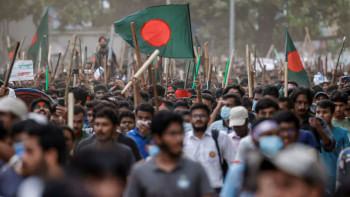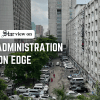Regain the land and regain its soul too

We had lost both in the last decade and a half. We belonged to the land, but the land was anything but ours. Those who usurped power over time became like Doctor Faustus, and sold not only the soul for an eternal life but its body too to the devil. Otherwise, how can one be moved to tears at the destruction of a statue but remain impassive and unmoved by the deliberate killings of hundreds of young people? Ambition and greed trumped over ethics and morality, public good was sacrificed for personal aggrandisement, and the country was subordinated to the self. We were ruled, not governed.
The land was not ours because we were deprived of the right to choose our leaders to represent and govern the country. We were not only denied the right to shape our own destiny and determine the trajectory of our progress, but we were also robbed of our right to criticise the usurpers, to question them and hold them accountable.
Imagine for a moment that the people, being the employer—because it is their money that pays for the perks, privileges and all the trappings that go with the VIP tag, from the highest office of the country to the lowest paid peon—had lost their right to question whether their employees were doing their jobs properly and, if necessary, admonish them for dereliction of duty. Various anti-people and anti-democratic laws, such as the Digital Security Act, were enacted through a submissive parliament and validated by a compliant judiciary, hanging over the people like the sword of Damocles. Crossing their defined line meant incarceration, enforced disappearance and, in some cases, death.
So great was the fear infused by the coercive nature of the administration that even the media—the very few that had not surrendered to and become a part of the establishment—exercised such extreme level of self-censorship that it contradicted their primary responsibility of informing the people and holding the establishment to account (see my article, "Surrender of the Fourth Estate?").
Can we rightfully claim the land to be ours when emissaries from a so-called friendly country applies "friendly" pressure on an opposition leader unwilling to participate in an election which had zero credibility, urging his participation to lend it validity so that a proxy in Bangladesh could come to power and do their bidding? The result: 15 years of politics without democracy, a parliament with a peculiar and unique arrangement where the opposition was also a part of the government and where laws were enacted by trampling on the people's interests.
Can we claim the land to be ours when the state abdicates its bounden duty to ensure safety and security of individuals and groups? Dissenting voices were silenced through enforced disappearances, extrajudicial killings and stage-managed encounters with the same narratives. Government agencies' operatives, in plain clothes, were on overdrive, picking up people without even adhering to legal norms. The agency that was supposed to provide security to the people became the cause of their insecurity (see my article, "When state becomes the cause of its own insecurity").
How can we claim the land to be ours when our strategic assets are frittered away to meet the so-called security concerns and geo-strategic and economic interest of a big neighbour? I don't recall any bilateral agreement or treaty in the last 15 years being ratified by Parliament. National interest was sacrificed at the altar of partisan interests. The comments and actions of some advisers to the prime minister made one wonder whether they were appointed to uphold the interests of the nation or the neighbour (see my article, "What have we done with our strategic assets?").
The country lost its soul too. And it began with the commercialisation of the most revered and sanctified part of our history the Liberation War, and with it the name of Sheikh Mujib—the two were commercially and politically overused. And what excesses were done in their names!
A wedge was driven that divided the people into various camps, into "we" and "they." And it was done successfully. The people were asked to think in binary terms—to choose between their faith and their ethnic identity, defying the underlying essential truth that the two were not mutually exclusive, and that one can exist with multiple identities.
We lost our soul when the constitution was ravished by the combined effort of a warped parliament and judiciary—the greatest harm done to the country's democracy by a dissolute chief justice whose fealty to the party in power borders on criminality.
The ultimate damage to the soul was inflicted by corrupting the judicial system. This is to be expected when the chief justice is forced out of office at the point of a gun for a verdict that did not sit well with the party in power, as it obstructed their efforts to exert control over the judiciary.
What kind of soul resides in a body that allows wrongful confinement for indefinite periods, or endures the complicity of the judiciary and law enforcing agencies in scuttling the investigation and trial of the gruesome murder of a journalist couple, allegedly killed for possessing information related to people close to power who would have exposed their anti-state activities (see my article, "The long road since 48 hours"), or that of a young soul from Narayanganj killed by a member of a family belonging to the ruling party?
A raft of issues needs addressing. Admittedly, each requires separate treatment. We must start by assessing the loopholes in the system and how they have been exploited to corrupt it.
The guiding document—our constitution—should be the first focus for the current regime. We cannot have elected representatives turn into autocrats. Mere elections do not make a country democratic. We want democracy not just every five years, but every day of our lives. The past administration was essentially a one-woman show. This must be prevented by adding appropriate provisions to the constitution. Remember, Hitler was also popularly elected. Politics must be spared from becoming a family affair (see my articles, "Democracy means more than the ability to vote" and "Who killed democracy in Bangladesh?"). Only the people are sovereign. As a corporate entity, they are beyond question.
The judiciary should be separated from the administration, and the Election Commission delinked from the administration.
The police should be recast, more than notionally like bringing changes in the dress, but by implementing the measures recommended in the Draft Police Ordinance 2009. Their operational procedures, arms and accoutrements should be revamped. In a civilised society, we cannot afford for the police to become the armed wing of the party in power, the kind we suffered over the last 15 years (see my articles, "Can citizens' expectations from the police be met?" and "Who will guard the guards?").
Lastly, among internal issues, the duties and terms of reference for intelligence agencies should be revisited immediately. Over the past 15 years, it seems that these agencies, instead of ensuring state security and countering hostile intelligence, focused on securing the future of a political party. The Directorate General of Forces Intelligence, in particular, requires special attention (see my article, "DGFI's Lakshman Rekha").
As for our external relationships, we need to revisit all bilateral agreements and treaties to assess the benefits the country would draw from those. Otherwise, we ought to recast them in a manner and form that enhances our national interest. It was as if we were the Sindbad with the proverbial old man who would never get off our shoulders. We need to cast that old man off our shoulders.
The country can be regained by pursuing a robust and dynamic foreign policy where bilateral and multilateral relationship will be based on sovereign equality. Our foreign policy should be driven by our national security and interests, independent of another country's diktat, and should be designed to enhance our diplomatic manoeuvrability rather than be constrained by neighbouring demands. Treaties and agreements should be mutually beneficial.
Only when we are able to establish an egalitarian and pluralistic society—where the constitution will be respected by adherence to it and not by its violation, where the people will be governed by the rule of law, wherever it stems from, and not of men, when a person's qualities will be the prime consideration for his advancement and not his family connections, where the son or grandson will not have to bear his fathers or grandfather's cross, where people will be free to practice his creed without apologising for it and where people can coexist with multiple identities—will we be able to regain the nation's soul. This can be achieved by a new crop of leadership that builds bridges rather than divides the nation and is inclusive in their dealings. I believe it is time to pass on the baton.
I believe the student revolution was an outburst against the wrongs done to the people and the country. We now have the opportunity to correct those wrongs. Failure is not an option.
Brig Gen Shahedul Anam Khan, ndc, psc (retd) is a former associate editor of The Daily Star.
Views expressed in this article are the author's own.
Follow The Daily Star Opinion on Facebook for the latest opinions, commentaries and analyses by experts and professionals. To contribute your article or letter to The Daily Star Opinion, see our guidelines for submission.

 For all latest news, follow The Daily Star's Google News channel.
For all latest news, follow The Daily Star's Google News channel. 











Comments